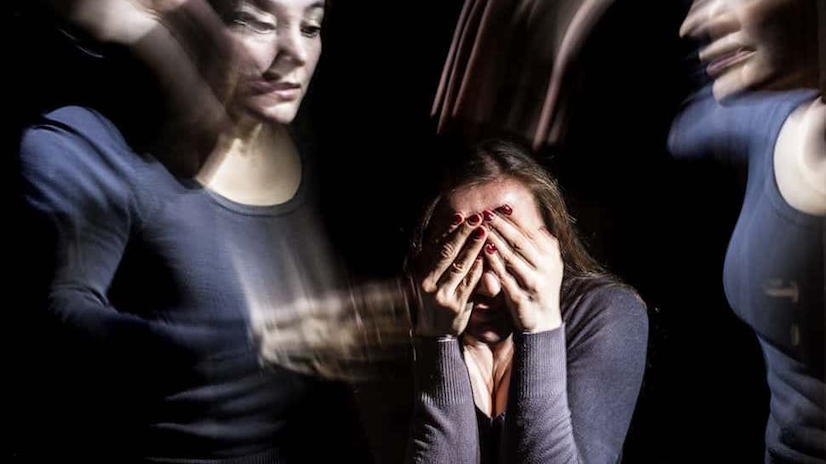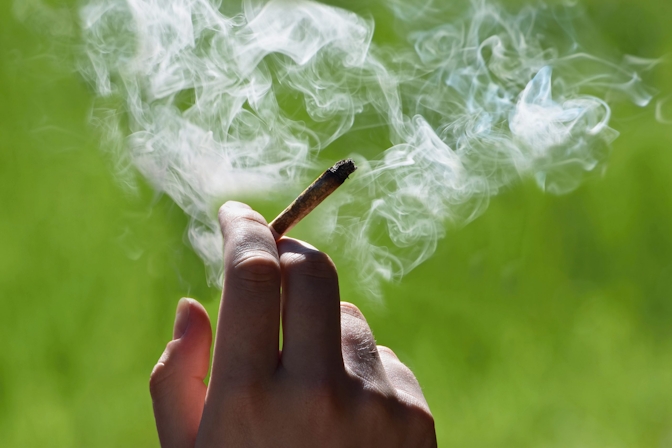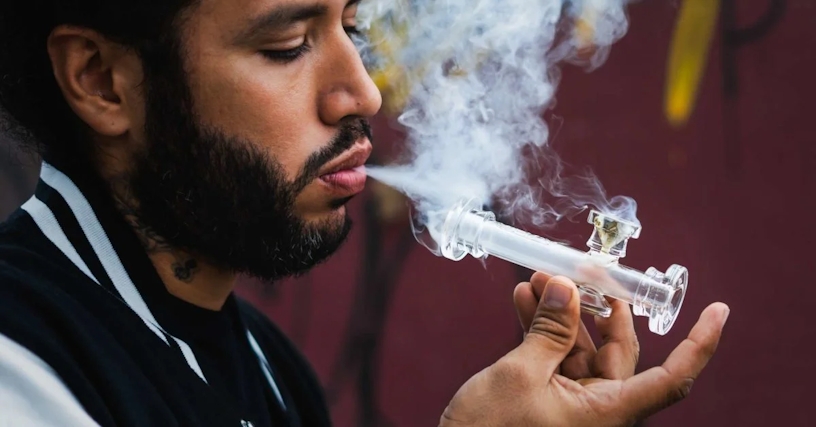
Can Weed Cause Psychosis?
A question frequently posed across social, academic, and medical spheres.
The conversation around cannabis has dramatically shifted in recent years, mirroring its growing legalization and the public’s increasing curiosity about its impact on health and well-being. At the heart of these discussions lies a crucial question: Is there a link between cannabis use and psychosis?
Join us as we dissect the depths of this relationship, looking at the various factors like THC potency, genetic makeup, age at first use, and the intriguing counterbalance offered by CBD.
Understanding Cannabis: Your Quick Rundown

Marijuana joint in the hand, drugs concept
Cannabis is more than just a plant; it’s a complex entity with deep cultural, scientific, and historical roots.
Central to the plant are cannabinoids, with over a hundred variants. The most prominent is tetrahydrocannabinol (THC), the psychoactive component causing the famous ‘high,’ and cannabidiol (CBD), known for its potential therapeutic benefits and lack of psychoactive effects.
Cannabis strains, classified broadly as sativa, indica, and hybrids, differ in their chemical makeup and effects. Sativa strains are typically linked with more cerebral, uplifting and energizing experiences, while indica strains tend to be more sedating. Hybrids offer a mix of these traits.
Historically, cannabis has been integral in medicinal, spiritual, and recreational realms, revered from ancient Egypt to China. Its consumption methods have evolved from traditional smoking to contemporary forms like vaporizing and edibles.
Despite this rich history, cannabis’s legal status remains contentious. While trending towards legalization, especially for medicinal use, it’s still heavily regulated in various regions.
Psychosis: Definition And Symptoms
Psychosis is a mental health condition characterized by a disconnection from reality. Those experiencing psychosis may have difficulty distinguishing between what is real and what is not, profoundly impacting their thoughts, perceptions, and behaviors.
Key symptoms of psychosis include:
Hallucinations
Sensing absent things, such as hearing voices or seeing things others do not.
Delusions
Strongly held false beliefs, often of a paranoid or grandiose nature, persist despite evidence.
Disorganized thinking
Manifested as confused or illogical thoughts, making it challenging to communicate coherently.
Disordered behavior
This can range from a noticeable decline in self-care to unpredictable or inappropriate actions.
Psychosis is not a disorder in itself but a symptom, often presenting in conditions like schizophrenia, bipolar disorder, or as a result of substance abuse, including potentially cannabis. The onset can be sudden or gradual, and the severity and duration of symptoms can vary widely.
Understanding psychosis is crucial in unraveling the complexities of its potential link with cannabis use, especially considering the plant’s psychoactive properties.
The Cannabis-Psychosis Link: Exploring Risk Factors
The interplay between cannabis use and the development of psychosis is a focus of ongoing scientific scrutiny. Research has highlighted several factors that may increase the likelihood of cannabis-induced psychosis:
High THC Concentration
A significant body of research, including findings from the Nation Institute on Drug Abuse, indicates that high doses of THC can heighten the risk of psychosis.
This is particularly true for individuals with pre-existing risk factors. THC’s ability to alter perception, mood, and cognitive functions can exacerbate psychotic symptoms such as intense hallucinations and delusional thinking.
A recent study in The Lancet Psychiatry reveals that daily use of cannabis with over 10% THC substantially increases the risk of a psychotic episode later in life.
Age and Frequency of Cannabis Use
The timing and frequency of cannabis use are critical factors. Several studies, including a comprehensive meta-analysis in the Journal of Substance Abuse, have linked cannabis use during adolescence—a crucial period for brain development—to an increased risk of psychosis in adulthood. Adolescents exposed to cannabis may experience lasting structural and functional brain changes.
Genetic Vulnerability
Genetics plays a crucial role in determining an individual’s susceptibility to cannabis-induced psychosis. Research has pinpointed specific genetic variants that elevate the risk, particularly when coupled with cannabis use. These genetic factors influence how THC is metabolized, potentially triggering psychotic episodes in those with a genetic predisposition. Understanding these genetic connections is crucial in assessing individual risk profiles.
Polydrug Use
Polydrug use, involving the concurrent use of cannabis and other substances like alcohol or hallucinogens, can significantly impact the risk of psychosis. This practice can intensify the
psychoactive effects of THC and lead to more severe cognitive and perceptual disturbances. The interaction of cannabis with other drugs may increase the likelihood of experiencing psychotic symptoms, especially in individuals with pre-existing mental health vulnerabilities.
CBD And Its Protective Potential Against Psychosis
CBD has been researched for its potential to mitigate the risk of psychosis. Unlike THC, CBD doesn’t induce a ‘high’ and might possess antipsychotic properties.
Some studies suggest CBD can alleviate psychotic symptoms, offering a safer alternative to traditional antipsychotic drugs. It’s also thought to counterbalance THC’s psychoactive effects, potentially reducing anxiety and paranoia linked to psychosis.
Nevertheless, this area of research is still in its infancy, and more studies are needed to understand the protective capabilities of CBD against THC-induced psychosis fully.
Harm Reduction And Safe Cannabis Practices

Adopting harm reduction strategies and safe cannabis practices is crucial in mitigating risks, especially for individuals prone to psychosis. Key approaches include:
Choosing Lower THC Products
Opting for cannabis strains with lower THC content and higher CBD levels can reduce the likelihood of adverse psychoactive effects.
Moderation in Use
Limiting the frequency and amount of cannabis consumption is essential, particularly for new users or those with a history of mental health issues.
Avoiding Use During Adolescence
Given the potential impact on the developing brain, adolescents are advised to abstain from cannabis use.
Education and Awareness
Staying informed about the effects of cannabis, recognizing early signs of adverse reactions, and understanding individual risk factors are key to using safely.
Consulting Healthcare Professionals
Regular consultations with healthcare providers can help in making informed decisions, especially those with pre-existing mental health conditions. By emphasizing these harm-reduction strategies, individuals can make more informed choices about cannabis use, reducing the risk of psychosis and other adverse outcomes.
Herb Recommended Products:
READ MORE










